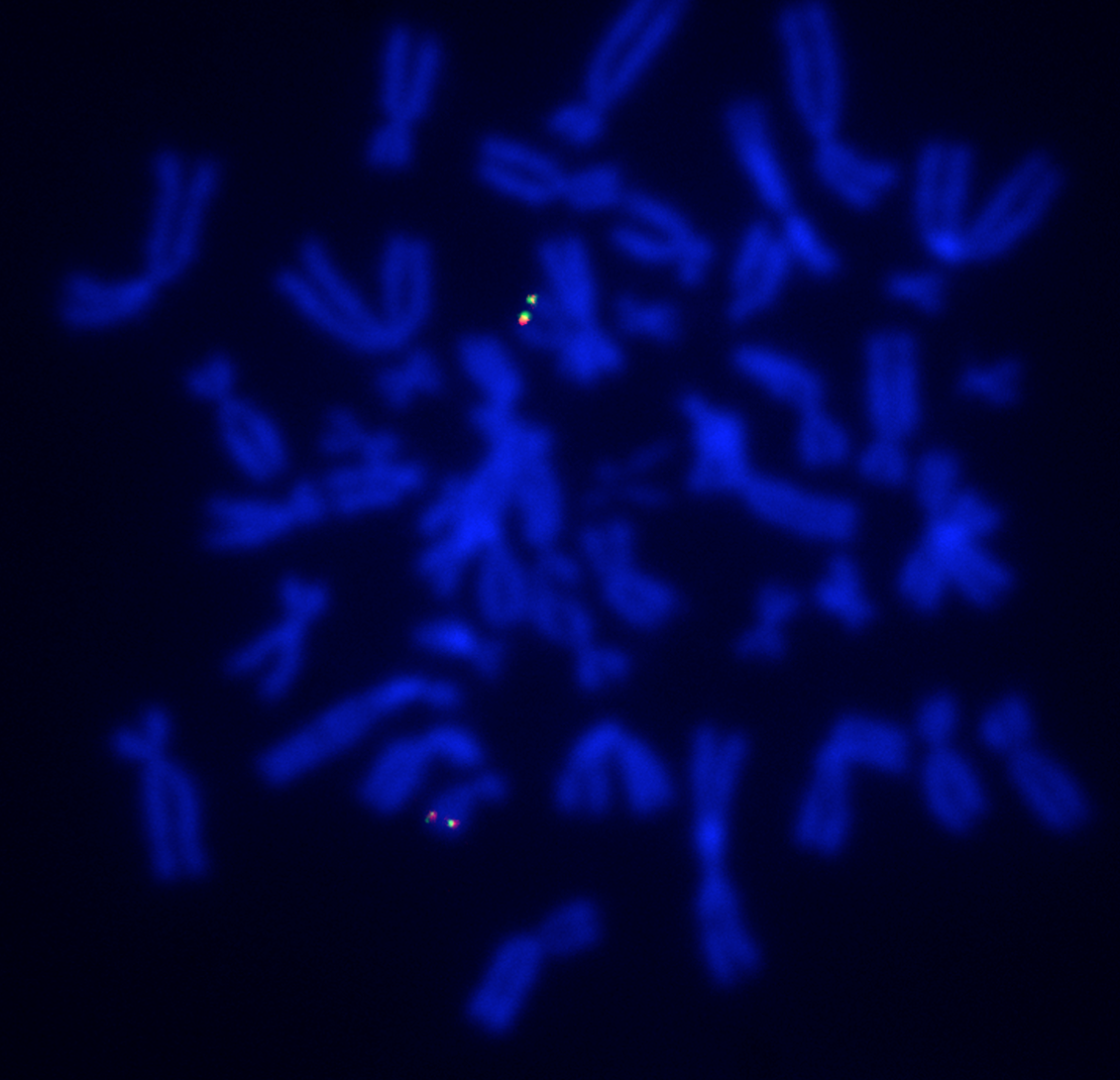Pinpoint FISH™ Probes
Bioinformatically designed, synthetic oligonucleotide probes provide unparalleled precision, with their high signal-to-noise ratio and the lowest background.

Above Fig. Metaphase Pinpoint FISH assay designed to monitor two genomic loci near the telomeric ends of a pair of homologous chromosomes. No chromosomal aberrations are visible in this picture, the green and red probes are not displaced from their expected positions.
Experience the Next Generation of FISH Assays with Pinpoint FISH™ Bioinformatically Designed Oligonucleotide Probes
Pinpoint FISH™ Applications Include:
Detection of Genetic Abnormalities: Whether using in situ hybridization (ISH) or fluorescence in situ hybridization (FISH) methods, you can easily identify genetic abnormalities, such as mutations in oncogenes or tumor suppressor genes, which are commonly found in cancer cells. An important tool for aiding in diagnostics of specific types of cancer.
Customized for Target Genes: Our Pinpoint FISH™ DNA probes can be customized for different types of specific genetic alterations associated with those cancers. For example, there are probes designed for relevant genetic markers such as EFGR, TP53, and ALK.
Research and Diagnosis: Pinpoint FISH probes are available for Research Use Only, although probes produced as Analyte Specific Reagents can be developed and supplied for use in CLIA compliant testing labs. These probes help scientists better understand the molecular mechanisms of cancer.
Explore our Catalog Below, and Contact Us Today!
Service & Probe Catalog
Chromosome Paints
Gain valuable insights into cell line stability and genotoxicity through reliable detection of chromosomal abnormalities, including translocations, insertions, and aneuploidy, using whole chromosome FISH paints. Pinpoint FISH chromosome paints are available in two formats, high density (HD) and medium density (MD).
KromaTiD HD paints are designed to cover all the unique genomic sequences in the genome and contain a high density of fluorescently labeled oligonucleotides. They provide more uniform fluorescence across the entire length of the target chromosome than MD paints and can be utilized for a broader range of research applications such as chromosomal territory studies. MD paints are designed with equal spacing of concentrated probe signals across the entire length of the chromosome.
Control Probes:
Our catalog of subcentromere and subtelomere probes can be used as controls in multiplexed assays with your gene targets as well as tools to identify and enumerate chromosomes. Both probe types are available in arm-specific formats, providing added flexibility in assay design.
Custom Pinpoint FISH™ Probes:
Design custom Pinpoint FISH™ probes for novel targets and assay configurations not possible with conventional BAC-derived FISH probes.
Probes are available for Research Use Only (RUO), although probes for use as Analyte Specific Reagents (ASR) can be produced and supplied for use in CLIA-compliant testing labs.
Order Pinpoint FISH™ Custom Probes
Order Pinpoint FISH™ Custom Services
Gene Probes
Gene probes are used to identify specific genetic sequences within a DNA sample, enabling researchers to pinpoint and study particular genes or identify mutations. They play a crucial role in various applications, such as diagnosing genetic disorders and studying gene expression in molecular biology research. We can design custom probes to virtually any human target as well as those from other species e.g., murine, canine, porcine, bovine, etc.
